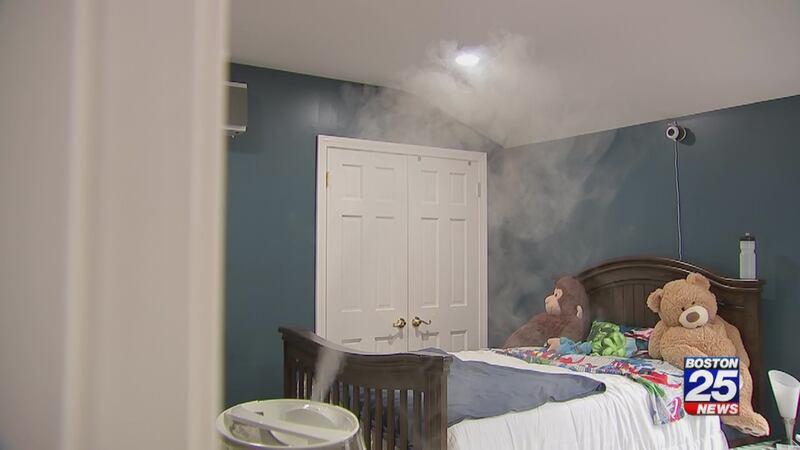BOSTON — When temperatures dip, Westwood mom Kathryn Morell makes sure both of her sons' humidifiers are up and running.
"We found that when we put that on it helps to keep the cough at bay, and having a little more moisture in the air helped them to kick the illness a little bit quicker," she said.
Bur researchers say humidifiers aren't just helpful for coughs.
Harvard Medical School lecturer, Pediatric Oncologist and molecular biologist Dr. Stephanie Taylor has been researching the importance of air humidity for years.
"I think this is one of the most effective precautions we can take in homes, schools, and hospitals" she told Boston 25 News.
Dr. Taylor and her colleagues studied close to 400 hospital patients, trying to narrow down the root cause of their hospital infections. They looked at everything from the number of visitors to hand hygiene.
What they found shocked even them.
"That's when we first found this relationship between dry indoor air and infections...we didn't believe it. We just thought, that's crazy," Dr. Taylor said.
After a second analysis, one factor stood out: when indoor air was dry, as it tends to be in the winter, infection rates went up.
She says it's all about microbes in the air, which are the microscopic organisms all around us.
Most microbes are good, but the ones that tend to survive in a dry environment, and that actually become airborne, cause viruses and bacterial infections. So while hand washing is important, it can't always protect you from germs.
"We need hand hygiene -- that's important -- but when the air is dry and has these infectious particles floating around, they resettle onto surfaces," said Dr. Taylor. "The problem is your hands can get re-contaminated from the air from things settled out of the air onto your hands and you don't even know it because you haven't touched anything."
Dr. Taylor says dry air also harms our body's natural immune barriers that fight infections.
"You know, you go on a long airplane flight like over a couple of hours, your lips get chapped, your nose gets dried out, and then you know a day into your vacation you might have a sinus infection or a cold," she said.
Dr. Taylor's research found the ideal humidity levels for indoor air range between 40 and 60 percent relative humidity. So how do you know what the air level is in your air? There are inexpensive devices called "hygrometers." Boston 25 News found one at a local store for less than $15. Dr. Taylor says every office, school, hospital and home should have one, along with a humidifier.
Dr. Taylor also points to a study at the Mayo Clinic involving a preschool where half of the school was given humidifiers in the winter, and half were not. They specifically were tracking flu rates and found that in the humidified half of the school, the absenteeism rate dropped by about 66 percent.
Most recently, Dr. Taylor was contacted by the federal government to look at the impact of air humidity on all federal employees.
"Many of their federal employees were not productive, were stressed out all of the time, and they weren't sleeping at night," Dr. Taylor says government officials explained to her. "And they thought, 'this is funny, this seems to be sort of like bunched in certain buildings we're having this problem,' and they said we did a big study, we surveyed the indoor environment, we looked at VOC's, we looked at acoustics, we looked at lighting, we looked at cubicles versus non-cubicles. And then we also tested the employees and found that when the air dries out, people were stressed and not sleeping at night," said Dr. Taylor.
But before you go buy a portable humidifier, Dr. Taylor thinks they're not as effective because they don't circulate around an entire house. She recommends a larger, steam one with a fan and says since she installed two in her home, she and her husband haven't been sick.
Dr. Taylor's advice on buying a humidifier
She predicts this new knowledge could someday affect the way we build homes. She'd know because Dr. Taylor recently went back to school to get a master's degree in architecture to apply it to her research.
And she's excited by the prospects of a future where many of us are a lot less sick.
"It's easy. It's right in front of us. it's sort of like inventing the paperclip. It's like, 'oh that's simple,'" said Dr. Taylor.
For more information on Dr. Taylor's runs Taylor healthcare consulting, you can find her research on her website.
Cox Media Group








